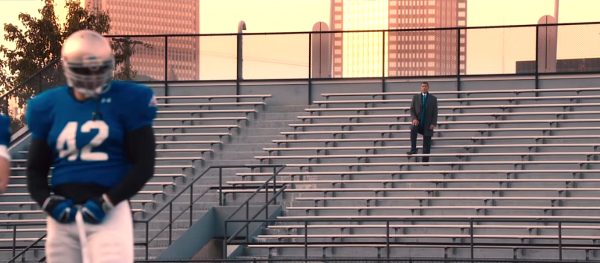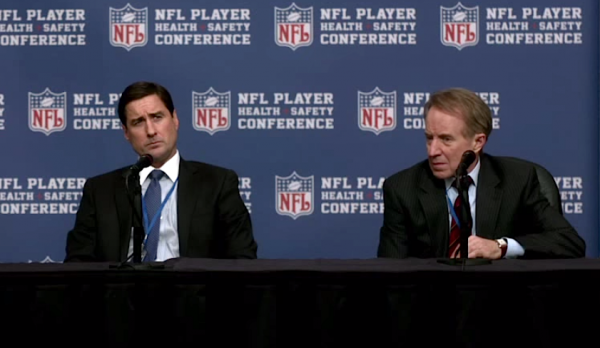[Note: This is a reprint of our review of Concussion from the AFI Film Festival; the drama is released nationwide today]
How morally objectionable is it to be a fan of professional football today? I must confess that I am. I follow my team like an addict, I have their Super Bowl pennant hanging at my desk, and it's all my father and I talk about. But I also cringe at this week's footage of Odell Beckham, Jr. deliberately headhunting a defender he was having issues with, launching his head directly at Josh Norman's head, with a ten-yard head start, and yet he wasn't even tossed from the game. Can we truly believe that the NFL is concerned about the long-term effects of head trauma when they first tried to sweep it under the shield?
Concussion is the narrative film that dramatizes a doctor discovering CTE—a chemical protein that is created in the brain from repeated blows to the head and can cause the brain to deteriorate—after it was found in numerous former NFL players who died too young, and whose bodies were otherwise healthy. Concussion has an awards-friendly calendar date of Christmas, but it also an odd calendar date, considering that that month and the following month are the biggest months for the NFL and college football.
Fans who want to blindly watch football without feeling bad about the product are not likely to rush out to see Concussion, for fear of being lectured to about the game. I doubt that they'd mind a lecture to the NFL itself, though. Concussion does try hard to appeal to fans by having a few monologues on the beauty of the game spliced together with delicate toe-tap receptions in the end zone, but what would've actually been more appealing is if they went even harder at the NFL. In attempting to have wider appeal, Concussion misses that point. Fans love the players and emblems, not "The Shield", which works for the owners, not the fans or players (and who continuously make the wrong choices for player safety by trying to add games, playoff teams, and games in foreign countries, to add to their individual wealth—and they can hold cities hostage by making them foot the bill for a new stadium, otherwise they'll move their product elsewhere).
A hard-hitting documentary that lays out all the lies the NFL made about concussions and the eventual finding of CTE already exists. It's called League of Denial and it is fantastic. Instead of swinging hard at the league, however, Concussion tells the personal story of the immigrant doctor who discovered and named CTE, Dr. Bennet Omalu (Will Smith). Omalu works on dead bodies. He has a thorough work ethic that annoys some, but inspires others. When Hall of Famer Mike Webster (David Morse) arrives on his autopsy table, his superior wants it taken care of as quickly as possible to retain the fallen hero's dignity—but Omalu thinks that dignity includes the truth. Because Webster, 50, is otherwise healthy, he goes deep into brain tissue tests and discovers that America's favorite sport has a dark shadow of protein cells that can choke the brain later in life.
Writer-director Peter Landesman films the former players who die without a care for their dignity, just their victimization. We only see a former player in moments of distress, followed immediately by their suicide. Going between players, but limiting the science to Omalu, and inserting a romance leaves Concussion imbalanced. It drops the ball because it can't commit to the best way to approach such a big subject.
Not to be vulgar, but Concussion the movie, operates the same as Omalu describes the human brain sliding around our skulls in collisions. Its narrative slides back and forth between the personal immigrant story, to a romance, to a corporate takedown, etc. The result is that it loses any identity that it had.
Concussion features a few good asides from the immigrant perspective—Omalu puts down an NFL doctor who studied in Mexico, likely because his original Nigerian degree was perceived as too little in America—but those asides start to become hollow, and it starts to feel that the only reason for their inclusion is to appeal to the audience. For instance, there is a monologue about what it means to be American that Omalu, who is Nigerian, delivers to his Kenyan wife-to-be (Gugu Mbatha-Raw), that would better serve the film if Omalu was more disillusioned by corporate America's response to his findings. We never see Omalu struggle to trust the system, even when the system is screwing him professionally.
To its minor credit, Concussion doesn't give the NFL a pass, but it doesn't make us as angry as it should. That is perhaps because Landesman boxes his NFL narrative around Omalu, which effectively keeps us out of the room with the commissioner, Roger Goodell (Luke Wilson, only seen on TVs) and out of any rooms of debate with the NFL (who will not acknowledge his research). Omalu's new partner and former company man—as a doctor for the Pittsburgh Steelers—Dr. Julian Bailes (Alec Baldwin) is granted that access while Omalu waits in hotel rooms and lobbies. The performances in Concussion are fine (Smith is quite good, Albert Brooks gets in a few good jabs, but Mbatha-Raw is frustratingly used only to echo Omalu's drive and isn't given her own immigrant perspective), and in leading some discourse, at least it's in the stadium. But Concussion doesn't really enter the game. It holds a clipboard on the sideline.
Rating: C




